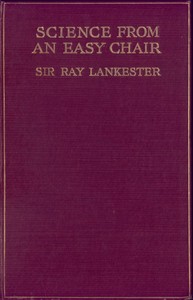Science from an Easy Chair by Sir E. Ray Lankester
"Science from an Easy Chair" by Sir E. Ray Lankester is a collection of essays written in the early 20th century. The work compiles articles originally published in the "Daily Telegraph" between 1908 and 1909, aimed at making scientific concepts accessible to the general public. Lankester discusses a range of scientific topics, illustrating them with examples and insights drawn from his extensive knowledge of natural history. The opening of the collection presents
a preface where Lankester reflects on the joy and value of scientific discovery. He highlights the importance of scientific advancements in public health, providing the example of Colonel Gorgas and the successful eradication of yellow fever in Cuba and Panama. Lankester emphasizes that such achievements are the result of applying scientific principles to practical problems, which not only improves conditions for humanity but also enriches the individual who contributes to these advancements. This introduction sets the tone for a broader exploration of themes that intertwine science and human experience. (This is an automatically generated summary.)
Read or download for free
| How to read | Url | Size | |||
|---|---|---|---|---|---|
| Read now! | https://www.gutenberg.org/ebooks/57136.html.images | 1.0 MB | |||
| EPUB3 (E-readers incl. Send-to-Kindle) | https://www.gutenberg.org/ebooks/57136.epub3.images | 3.3 MB | |||
| EPUB (older E-readers) | https://www.gutenberg.org/ebooks/57136.epub.images | 3.3 MB | |||
| EPUB (no images, older E-readers) | https://www.gutenberg.org/ebooks/57136.epub.noimages | 472 kB | |||
| Kindle | https://www.gutenberg.org/ebooks/57136.kf8.images | 3.5 MB | |||
| older Kindles | https://www.gutenberg.org/ebooks/57136.kindle.images | 3.4 MB | |||
| Plain Text UTF-8 | https://www.gutenberg.org/ebooks/57136.txt.utf-8 | 855 kB | |||
| Download HTML (zip) | https://www.gutenberg.org/cache/epub/57136/pg57136-h.zip | 3.1 MB | |||
| There may be more files related to this item. | |||||
Similar Books
About this eBook
| Author | Lankester, E. Ray (Edwin Ray), Sir, 1847-1929 |
|---|---|
| LoC No. | 10024460 |
| Title | Science from an Easy Chair |
| Note | Reading ease score: 57.0 (10th to 12th grade). Somewhat difficult to read. |
| Contents | Science and practice -- University training -- Darwin's theory -- Darwin's discoveries -- Darwin's theory unshaken -- Metchnikoff and Tolstoi -- The land of azure blue -- Fresh-water jelly-fishes -- The story of the common eel -- Modern horses and their ancestors -- A rival of the fabled upas tree -- Poisons and stings of plants and animals -- The dragon: a fancy or a fact -- Oysters -- Maternal care and molluscs -- The heart's beat -- Sleep -- The universal structure of living things -- Protoplasm, life and death -- Chemistry and protoplasm -- The simplest living things -- Tadpoles and frogs -- About the stars -- Comets -- About cholera -- Sea-breezes, mountain air, and ozone -- Oxygen gas for athletes and others -- Sparrows, trout, and selective breeding -- The feeble-minded -- Death-rates -- Gossamer -- The jumping bean -- Protective colouring in animals -- Hop-blight -- Green-flies, plant-lice, and parthenogenesis -- The deadly Phylloxera -- Clothes moths -- Stone and wood borers -- Christmas fare -- The origin of opium -- The most ancient men -- The cave-men's skulls -- More about the Neander Men. |
| Credits |
Produced by Susan Skinner and the Online Distributed Proofreading Team at http://www.pgdp.net |
| Language | English |
| LoC Class | Q: Science |
| Subject | Science |
| Subject | Natural history |
| Category | Text |
| EBook-No. | 57136 |
| Release Date | May 11, 2018 |
| Copyright Status | Public domain in the USA. |
| Downloads | 139 downloads in the last 30 days. |
| Project Gutenberg eBooks are always free! | |

